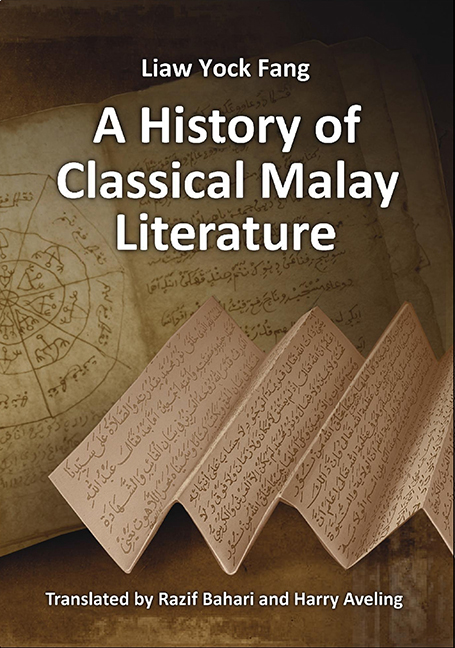Book contents
- Frontmatter
- Contents
- Preface
- List of Abbreviations
- Chapter I Folk Literature
- Chapter II The Indian Epics and The Wayang in Malay Literature
- Chapter III Javanese Panji Stories
- Chapter IV Literature Belonging to the Period of Transition from Hinduism to Islam
- Chapter V Literature of the Islamic Age
- Chapter VI Framed Narratives
- Chapter VII The Literature of Islamic Theology
- Chapter VIII Historical Literature
- Chapter IX Classical Malay Law Codes
- Chapter X Poetic Forms (Pantun and Syair)
- Bibliography
- Index
- Biographical Details
Chapter V - Literature of the Islamic Age
Published online by Cambridge University Press: 21 October 2015
- Frontmatter
- Contents
- Preface
- List of Abbreviations
- Chapter I Folk Literature
- Chapter II The Indian Epics and The Wayang in Malay Literature
- Chapter III Javanese Panji Stories
- Chapter IV Literature Belonging to the Period of Transition from Hinduism to Islam
- Chapter V Literature of the Islamic Age
- Chapter VI Framed Narratives
- Chapter VII The Literature of Islamic Theology
- Chapter VIII Historical Literature
- Chapter IX Classical Malay Law Codes
- Chapter X Poetic Forms (Pantun and Syair)
- Bibliography
- Index
- Biographical Details
Summary
We do not know for certain when Islam arrived in the Archipelago or from where it came. In general, scholars believe that a tombstone belonging to a Muslim woman found in Leran (Gresik) and dated 1082 is the oldest remaining Muslim relic. Scholars also agree that a Muslim village must have existed there at that time. According to these scholars, Muslim traders very seldom brought their families with them on long journeys. When they stayed in a place for a considerable time, they would marry the local women after converting them to Islam. However, the woman whose grave was found in Leran was certainly not a convert. Her father's and grandfather's names were also appended to hers on the gravestone: “Fatimah binti Maimun ibn Hibatullah” (S. Q. Fatimi, 1963: 39).
After this discovery, there are no other findings that attest to the presence of Islam in the Archipelago for the next 200 years. However, further indications of the presence of Islam surfaced in the 13th century. In 1292, Marco Polo reported that a large number of people in Perlak (in Acheh) had already embraced Islam. In 1297, Al Malikus-Saleh, the first Muslim king of Samudra Pasai, passed away. At about the same time, Pasai sent an envoy to China. The envoys were Muslims and were called Hasan and Sulaiman. This meant that at that time, Pasai had a sufficient number of Muslims among its populace for some of them to be selected as important state officials.
The rapid growth of Islam in the Archipelago is connected with the spread of Islam across the world during that time. In 1196, Gujarat was conquered by Muslims. This meant that the Gujaratis, who came to trade in this region in great numbers, were now made up of not just Hindus but included Muslims as well, possibly of other ethnicities. In 1258, Baghdad fell into the hands of the Mongols and as a result, inland trade came to a halt. Muslims started venturing out to sea to explore distant lands in the East.
- Type
- Chapter
- Information
- A History of Classical Malay Literature , pp. 184 - 263Publisher: ISEAS–Yusof Ishak InstitutePrint publication year: 2013

